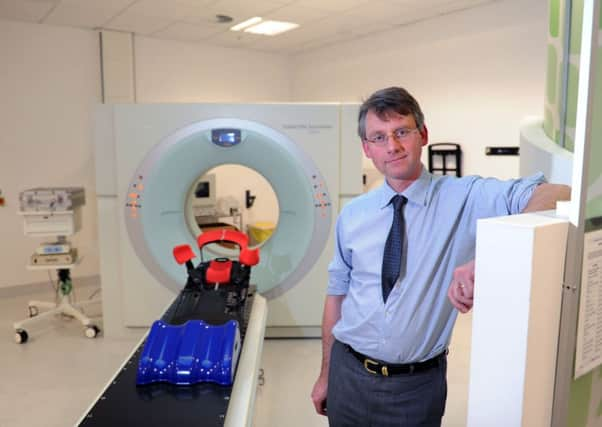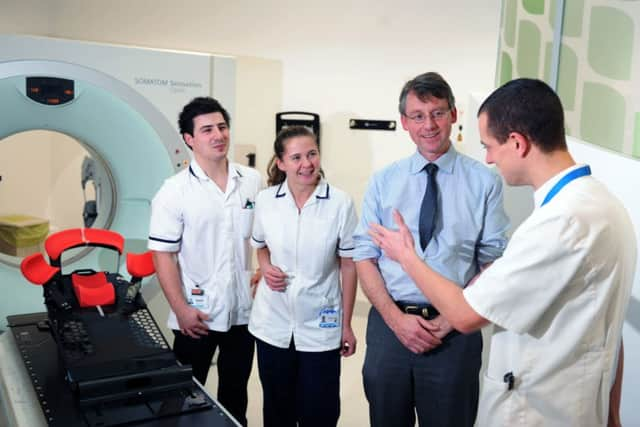Listening to patients and staff at heart of new hospital chief’s personal vision


Julian Hartley is a man with a plan.
As the new boss of one of the biggest hospital trusts in the country, he needs one.
His aim, among other things, is to ensure that the care provided is always compassionate and confident.
Advertisement
Hide AdAdvertisement
Hide Ad

That’s something all patients would agree should be the case.
And he knows from his own experiences on the “other side” how much of a difference that can make.
A few years ago, he suffered a serious cycling accident which left him with several broken bones
What made a big difference, when he was waiting to go to the operating theatre, seriously injured, was the simple personal touch.
Advertisement
Hide AdAdvertisement
Hide Ad“When the junior doctor was screwing the metal brace into my skull, there was a nurse holding my hand throughout that and telling me it was going to be OK, and talked to me using my first name,” he said.
“You remember stuff like that. That’s what I mean about the importance of patient care in a way that is compassionate, is personal, goes above and beyond the norm.”
Taking on the role of chief executive of Leeds Teaching Hospitals NHS Trust (LTHT), Julian has gone back to his roots.Born in Keighley, he has crossed the Pennines from jobs in the north west to return to West Yorkshire.
Leeds Teaching Hospitals, which runs Leeds General Infirmary and St James’s Hospital, sees more than two million patients a year and has an annual budget of £1bn.Its specialities include carrying out kidney and liver transplants, it houses the biggest cancer treatment centre in Europe and provides children’s congenital heart surgery – which has been one of its most scrutinised services over the last few years.
Advertisement
Hide AdAdvertisement
Hide AdThough home to leading expertise in a number of fields, the city’s hospitals have faced their fair share of challenges. Several years ago rates of hospital superbugs, especially MRSA, were heavily criticised and a special Government team was sent in to get the situation under control.
Since then the rates have dramatically fallen, though trust chiefs know they must keep a sharp eye on the issue.
More recently there have been concerns over quality of care, as raised in a Care Quality Commission (CQC) report a few years ago, while last year more problems arose around meeting waiting time and accident and emergency targets.
These problems are now under control, but finances remain a worry – the trust has not yet managed to end a financial year with the surplus needed to enable it to apply for the gold standard foundation trust status.
Advertisement
Hide AdAdvertisement
Hide AdLast month it was revealed that private consultants KPMG had been brought in by the hospitals trust to help them urgently tackle a looming financial crisis.
Mr Hartley doesn’t shy aware from the challenges faced by the organisation.
“It is a really important time for Leeds. The process we are in is diagnosing the challenges and making sure we have a plan to deal with them. We need some thinking time to really get to grips with where we are and the size of the challenge ahead.
“There’s no doubt that things like duplication, inefficiency and waste are things we need to bear down on.”
Advertisement
Hide AdAdvertisement
Hide AdHe says that he and his team are still assessing the situation and developing their plan to deal with the issues faced. At the moment, he won’t be drawn on what the impact of any changes which may be made in future.
Since arriving in Leeds in autumn, Mr Hartley has spent much of his time talking to staff and visiting a range of different wards and departments.
That has included speaking to parents at Leeds Children’s Hospital, hearing about some of the trust’s innovative work such as the hand transplant carried out last year by Prof Simon Kay, and visiting the Leeds Musculoskeletal Biomedical research Unit at Chapel Allerton Hospital.
He’s been to the trust’s other outlying hospitals, seeing the satellite renal dialysis unit at Seacroft and the reproductive medicine unit there, and visiting Wharfedale Hospital in Otley.
Advertisement
Hide AdAdvertisement
Hide Ad“I’ve also spent time in less glamorous, or more support settings, such as the medical records staff who live in the bowels of St James’s with all the notes for patents,” he added.
“There’s a long list. Seeing all of that, I have a strong sense of the real passion and commitment that staff have for delivering great care, but also some of the obstacles they face to that.”
Listening to staff is a crucial part of the new chief executive’s plan.
He has written to them, talked to them face-to-face and is using the interactive web tool crowdsourcing to enable staff to give feedback and share comments.
Advertisement
Hide AdAdvertisement
Hide Ad“The answers to the organisation’s challenges lie with the people. That’s why I’ve been spending a lot of time with staff on the frontline. One of the things I care deeply about is engaging all staff to improve quality of care.
“I think that Leeds has the potential to be absolutely great and one of the leading healthcare organisations in this country and it’s about harnessing everyone’s potential and effort and energy to do that, working as one team.”
Of course, as well as staff, listening to patients – he agrees – is critical. One of his main focuses is on patient safety.
“It’s stating the obvious to say patient care is at the heart of everything, of course it is, but what I’m talking about is something which runs through the organisation in a very meaningful way,” he said.
Advertisement
Hide AdAdvertisement
Hide AdHe say he is determined to listen to patients and take action where necessary, reducing serious incidents called “never events” to zero and improving responses to complaints.
Mr Hartley is backing a campaign led by Dr Kate Granger, who is living with terminal cancer but is determined to encourage personalisation of care through her initiative #hellomynameis.
“That personal touch is massively important, but so is compassion and the quality of care for patients,” he said.
“Patients and their safety and quality of care is fundamental to what we’re about, irrespective of what job you do,”
Advertisement
Hide AdAdvertisement
Hide AdIn addition to that, he wants to make the hospitals trust a good place to work, develop greater integration between the hospitals trust, local authority and other health bodies to led the way nationally.
And he has the considerable task of ensuring LTHT is on a sound financial footing. With all this to consider, it’s unsurprising that he finds it difficult to name one overall priority.
But, he says, it always comes back to patients and providing them with quality care.
“When you are feeling vulnerable, anxious or afraid, it’s so important that you have got healthcare professionals that treat you with respect, compassion and that you have confidence that they are going to deliver the very best,” he said.
Julian Hartley’s NHS career
Age: 46
Born: Keighley
Advertisement
Hide AdAdvertisement
Hide AdEducated: Bingley Grammar School, Durham University and Cambridge University
Career history: Started in NHS as management trainee in North East. Director level roles at NHS trusts in the north east and chief executive at trusts in the north west. Before joining Leeds, was managing director of NHS Improving Quality.
Family: Married to Karina with two children Lydia, 14, and Max, 11.